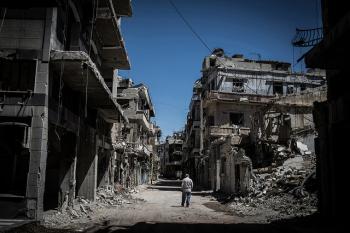Two images from Twitter of the situation on the ground in east Aleppo:
In one, overjoyed Syrians are seen singing and dancing around parked cars. An elderly woman grins with joy as she talks about her newfound freedom following the defeat of the "terrorists."
In another, a seven-year-old girl speaks to the camera: "I am talking to the world now live from east Aleppo," she says. "This is my last moment to either live or die."
Which scene best represents what happened in Aleppo last week? Was the fall of Syria's largest city a liberation or a massacre? And what do the differing narratives say about the Western media's coverage of this conflict?
As with America's position on Syria, there has been a pronounced contradiction in the version of the Syrian war being presented to the world by Western governments, and by extension some mainstream news outlets.
We condemn Daesh unequivocally and vow to annihilate them -- never more so than after recent attacks on Western soil. But in Syria and Iraq, the U.S and Britain (and their oh-so-trustworthy, head-chopping Gulf allies) have no problem arming them under the extremely ill-defined label of Syrian "rebels."
It's a strong assertion to make, but here are the disclaimers: Yes, not all of the Syrian opposition are Daesh and al Qaida-linked terrorists. Yes, there are peaceful revolutionaries who are opposed to President Bashar Al Assad's tyrannical regime, and who have every right to be. But let's not lose sight of the fact that a large number of these "rebels" are Daesh, or have some sympathy to their views, according to one leading U.K. think tank.
Let's also consider the fact that, no matter how hard you try to ensure that deadly weapons don't fall into the wrong hands, there's little likelihood you can fight an enemy when you have an opposition as splintered as Syria's. U.S President Barack Obama himself said in 2014: "You have an opposition that is disorganized, ill-equipped, ill-trained and is self-divided. All of that is on top of some of the sectarian divisions."
Critically, he also cited a classified study the CIA conducted at the time indicating that arming rebel factions against sitting governments almost always ends in disaster. The other disclaimer is that this does not mean that we should support, or look kindly upon, Assad's murderous regime and armed forces, backed by Russia and Iran. There are no good guys in this war. But that doesn't mean that we shouldn't hear both sides of the story. If some Syrians are celebrating the defeat of Syrian rebels, or if Syrian army soldiers are seen helping women and children retreat to safety, we need to hear that too.
We also need to employ more skepticism with claims made by Syrian rebels. How many people are aware, for example, that the Syria Campaign -- a key source for facts, images and stories of the horrors in Aleppo -- is an opposition-funded public relations company that works closely with Riyadh and Washington to fight for regime change in Syria?
That doesn't mean that the stories and images they put out (most vividly through the recently launched Netflix documentary The White Helmets) aren't real. But it does mean that they -- like the Iranians, Russians and Alawites in this conflict -- have a political agenda.
There's a war of words raging among western leftists on this issue, namely because some -- like Max Blumenthal and famed linguist Noam Chomsky -- have been accused of echoing Syrian regime sentiments. Perhaps they do.
But there's a fine line between heeding the arguments put forth by the enemy state and supporting its actions. If we truly want to resolve the quaqmire that exists in Syria today we need to understand what drives pro-Assad supporters to the bloody carnage they've imposed -- and offer unabridged perspectives of both sides.
In a world where fake news has become more widespread than ever (this phenomenon came to the forefront during the U.S. presidential election but has also been prevalent on social media in coverage of Syria), journalists and ordinary citizens must be wary of the narrative spewed by our governments.
Besides, let's also remember: Foreign-imposed regime change doesn't work. It wasn't so long ago the U.S. and Britain made war in Iraq and wound up leaving things even worse than they were before -- on the pretense of Iraq's "weapons of mass destruction."
There may not be any claim of WMDs in Syria but there are sound reasons to question everything we're being told -- and very good reasons to not support toppling another dictator.
This article was first published in iPolitics.
Photo: Chaoyue 超越 PAN 潘/flickr




Comments
Do
Don't